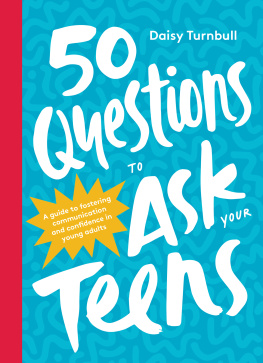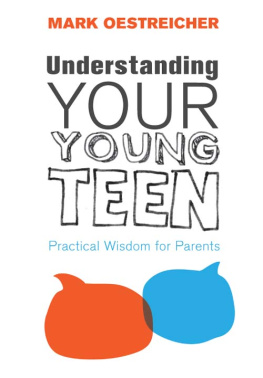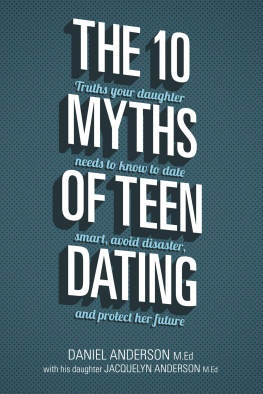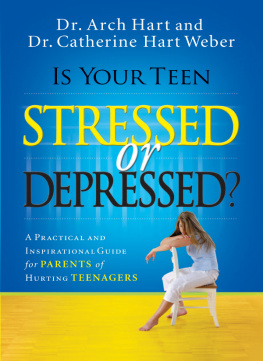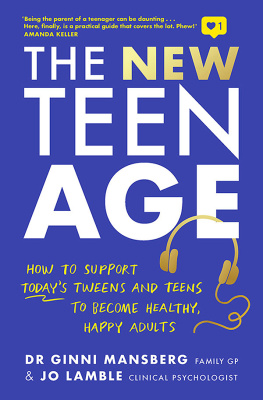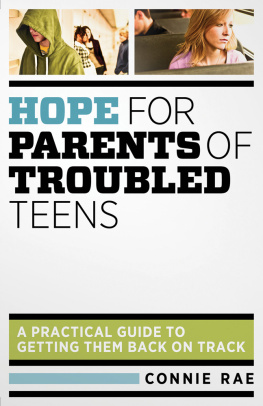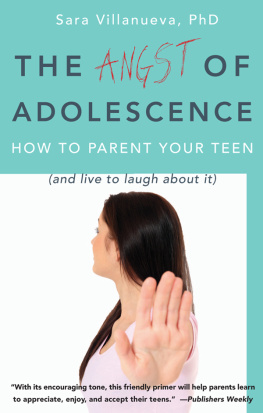David A. Wolfe - What Parents Need to Know about Teens: Facts, Myths and Strategies
Here you can read online David A. Wolfe - What Parents Need to Know about Teens: Facts, Myths and Strategies full text of the book (entire story) in english for free. Download pdf and epub, get meaning, cover and reviews about this ebook. year: 2007, publisher: Centre for Addiction and Mental Health, genre: Home and family. Description of the work, (preface) as well as reviews are available. Best literature library LitArk.com created for fans of good reading and offers a wide selection of genres:
Romance novel
Science fiction
Adventure
Detective
Science
History
Home and family
Prose
Art
Politics
Computer
Non-fiction
Religion
Business
Children
Humor
Choose a favorite category and find really read worthwhile books. Enjoy immersion in the world of imagination, feel the emotions of the characters or learn something new for yourself, make an fascinating discovery.

- Book:What Parents Need to Know about Teens: Facts, Myths and Strategies
- Author:
- Publisher:Centre for Addiction and Mental Health
- Genre:
- Year:2007
- Rating:3 / 5
- Favourites:Add to favourites
- Your mark:
- 60
- 1
- 2
- 3
- 4
- 5
What Parents Need to Know about Teens: Facts, Myths and Strategies: summary, description and annotation
We offer to read an annotation, description, summary or preface (depends on what the author of the book "What Parents Need to Know about Teens: Facts, Myths and Strategies" wrote himself). If you haven't found the necessary information about the book — write in the comments, we will try to find it.
As a parent, you want practical, accurate and user friendly information to help raise your teen. You want to know whats considered normal adolescent behaviour, how to determine whether your child is on a good path, how to encourage your teens healthy...
David A. Wolfe: author's other books
Who wrote What Parents Need to Know about Teens: Facts, Myths and Strategies? Find out the surname, the name of the author of the book and a list of all author's works by series.
What Parents Need to Know about Teens: Facts, Myths and Strategies — read online for free the complete book (whole text) full work
Below is the text of the book, divided by pages. System saving the place of the last page read, allows you to conveniently read the book "What Parents Need to Know about Teens: Facts, Myths and Strategies" online for free, without having to search again every time where you left off. Put a bookmark, and you can go to the page where you finished reading at any time.
Font size:
Interval:
Bookmark:
FACTS, MYTHS AND STRATEGIES
David A. Wolfe

Library and Archives Canada Cataloguing in Publication
Wolfe, David A.
What parents need to know about teens: facts, myths and strategies / David A. Wolfe.
Also available in PDF and HTML formats.
ISBN 978-0-88868-604-6
1. Parent and teenager. 2. Parenting. 3. Teenagers.
I. Centre for Addiction and Mental Health II. Title.
HQ799.15.W64 2007 649.125 C2007-904093-4
ISBN: 978-0-88868-589-6 (PRINT)
ISBN: 978-0-88868-590-2 (PDF)
ISBN: 978-0-88868-591-9 (HTML)
Printed in Canada
Copyright 2007 Centre for Addiction and Mental Health
No part of this work may be reproduced or transmitted in any form or by any means electronic or mechanical, including photocopying and recording, or by any information storage and retrieval system without written permission from the publisherexcept for a brief quotation (not to exceed 200 words) in a review or professional work.
For information on other CAMH publications or to place an order, please contact:
Sales and Distribution
Tel.: 1 800 661-1111 or 416 595-6059 in Toronto
E-mail: publications@camh.net
Website: www.camh.net
Disponible en franais sous le titre Ce que les parent doivent savoir sur leurs adolescents: Faits, mythes et stratgies
This book was produced by:
Development: Margaret Kittel Canale, CAMH
Editorial: Jacquelyn Waller-Vintar, CAMH; Deborah Viets; Deborah England
Design: Nancy Leung, CAMH
Typesetting: BTT Communications
Print production: Christine Harris, CAMH
3517a / 08-07 PM065
Youve probably picked up this booklet because you want practical, accurate and user-friendly information to help you raise your teen. You want to know whats considered normal adolescent behaviour, how to determine whether your child is on a good path, how to encourage his healthy development and how to get help when problems arise. There are many new things influencing teens today, but your parenting role is as important today as ever before. Spending time strengthening your relationship with your teen is the best investment in her future, just as it was when she was a child.
In my work with adolescents, Im often asked by parents, What do I need to know to help my teen avoid alcohol and other drugs, abusive peers or dating partners and other worries? News reports are filled with upsetting stories about injuries and other forms of harm stemming from drinking, driving, partying or bullyingwhich makes parents all the more concerned. Todays pressures on teens come in different forms than in previous generations, but pressure is pressure, and to a teen it can seem overwhelming at times.
Parents may also feel overwhelmed with the problems and situations teens bring home, especially when some of these didnt exist when they were growing up, like Internet bullying or chat rooms. Many parents feel they would benefit from advice about how to meet their teens needs, how to promote maturity and responsibility, and ways to avoid danger.
Its true that adolescence is the most dangerous period of development, especially from ages 16 to 19, and even extending to age 24, when many finish their college or university studies and save a bit of money before leaving (or being gently nudged from) the family nest. After age 16, the combination of greater access to adult privileges such as driving, extended curfews, alcohol and other drugs, empty family homes or even separate living arrangements makes this age ripe for trouble. But, the image of teens as immature, fun seeking and irresponsible is overblown and inaccurate. The vast majority of teens emerge from this period unscathedespecially when their parents or caregivers practise effective parenting and do their utmost to prepare, not scare, their teen for assuming these new responsibilities and the pressures that may accompany them.
As parents, we know that simply letting our teenagers learn for themselves is not a good choice. The risk of injury or long-term health problems that could result is too high. Likewise, simply telling teens they cant do certain things (Just say no!) doesnt work. Threatening them with consequences (If I catch you drinking, youll be grounded for a month!), or putting up legal, or family, roadblocks to curtail activities are not very effective with teens. We need to help them develop personal strategies, a sense of responsibility, and values that reduce their chances of harm, especially now that they are spending much more time doing things on their own.
We can choose to sit and wait for our teenagers to make mistakes and react to themusually through punishments or lecturesor we can try to head off problems by being a reliable source of information and support. While we cant make all the choices for them, we can assist them in making the most responsible choices possible. The best way to achieve this goal is to maintain a balance between being sensitive to their desires and needs, yet firm in providing guidance and direction.
Keep in mind that adolescence is all about experimentation. Because a certain amount of experimentation is normal, our job as parents is to figure out how to strike a balance between setting limits (yesteens need limits) and promoting their independence (yesteens need to develop their own limits). This balancing act between hanging on and letting go is a major challenge of parenting a teenager.
As the parent of a teen you need information about three key issues:
You need information about what behaviour is normalduring adolescence so that you can better understand and guide your teen. Because none of us is born an expert parent, you probably worked hard to understand your child during infancy and early childhood. Adolescence requires the same amount of effortif not more!
You need a basic understanding of how you and your family, in addition to your teen, are changing. By recognizing the challenges that you and your teen face during this time of rapid transition, you will be better prepared to be a source of strength and guidance.
Finally, you need information on the best ways to be an effective parent during this period of development so that you are strengthening your relationship with your teen and avoiding some of the common traps.
The purpose of this booklet is to help you get a better understanding of these key issues pertaining to adolescent development, and how your role as a parent can make an important difference in how teens develop the ability to make good choices. In three future booklets, we will discuss topics of specific concern in greater depthtopics such as substance use, peer and dating relationships, Internet use and adolescent well-being.
How teens manage their relationshipswith family members, with peers and with other important adultsis a key element in how they learn to make safe and responsible choices. Ultimately, the process begins with their relationship with you. Now as much as ever, what parents do does matter.
Lets begin by looking at some typical situations faced by Canadian families:
Mike and Wendy, both in their late 30s, have three children, two careers, a nice house in a great location with friendly neighboursand a problem. Their 14-year-old son, Jeremy, has been worrying them a lot lately. Ever since he started Grade 9, the old Jeremythe fun-loving, average school kid who won soccer medals, played in the band, and collected comics and Space Legoseems to have vanished. Now he spends his time either out or online with his new (and gruff) friends from high school, while his homework piles up and his grades drop. Any conversation he has with his parents rapidly turns into an argument, and the more Mike and Wendy try to get him to abide by the rules, the more surly and upset he becomes. They arent disagreeable parents, but they want him to see things their way. Is it wrong for them to make sure he eats and sleeps properly, gets good grades at school and doesnt get into trouble? Why does Jeremy make everything so difficult?
Font size:
Interval:
Bookmark:
Similar books «What Parents Need to Know about Teens: Facts, Myths and Strategies»
Look at similar books to What Parents Need to Know about Teens: Facts, Myths and Strategies. We have selected literature similar in name and meaning in the hope of providing readers with more options to find new, interesting, not yet read works.
Discussion, reviews of the book What Parents Need to Know about Teens: Facts, Myths and Strategies and just readers' own opinions. Leave your comments, write what you think about the work, its meaning or the main characters. Specify what exactly you liked and what you didn't like, and why you think so.

